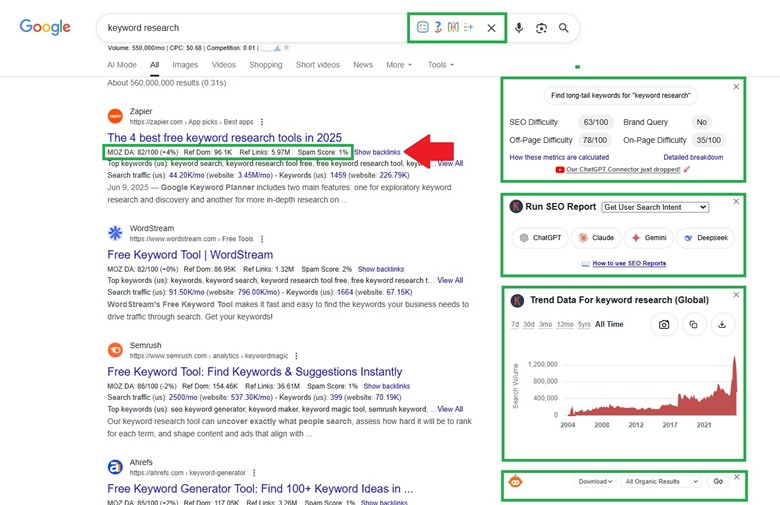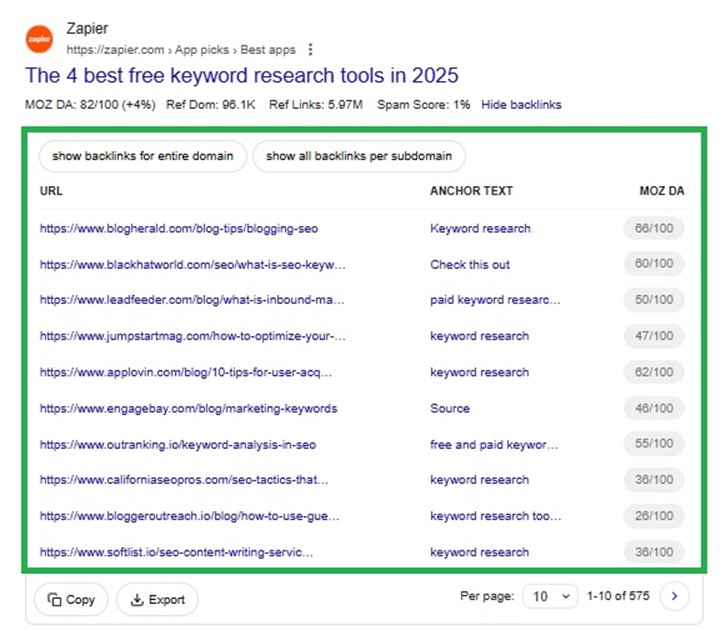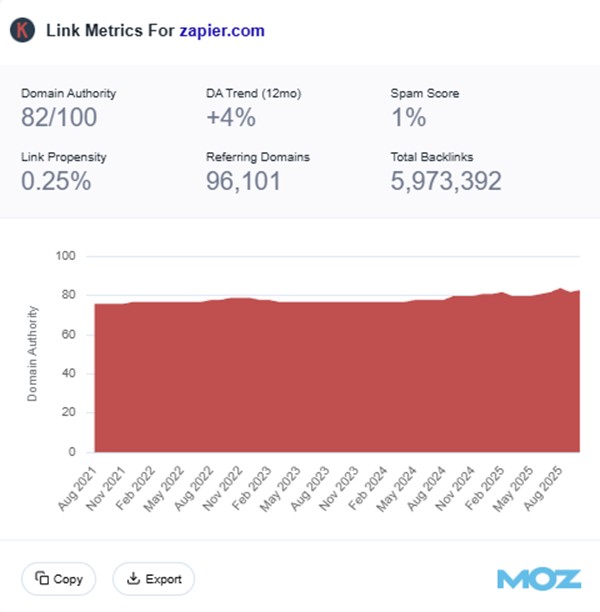Link building is just as old as, or even older than, the official introduction of SEO as a defined term. In fact, it wasn’t Google who started using link analysis as a ranking factor. Search engines before it, like RankDex, already started using links to measure the importance and quality of websites. When Google entered the scene and introduced PageRank, it made link building a central and foundational pillar of search engine optimization.
Eventually, SEOs caught on and started doing what they can to inflate their websites’ perceived authority through various link building tactics. A core part of a link building or off-page SEO strategy is backlink analysis, and to do that, one ought to work smarter using the right tools like a backlink checker.
What Is a Backlink Checker?
A backlink checker is an SEO tool for analyzing a website’s backlink profile, showing which other sites are linking to it, what anchor texts are used, and even the domain authority or quality of those links. Every backlink checker is different in terms of data coverage and feature design, but overall, they all help perform a lot of crucial link-building steps, including the following:
1. Perform competitive analysis
If the competition is winning the SEO game, you ought to grab every opportunity to look at their playbook. Using a backlink checker allows you to get a glimpse of their SEO strategy, identify their top link opportunities, and study their best-performing content in terms of organic link acquisition.
2. Monitoring your own website’s backlink profile
Routinely checking your own site’s backlink profile is also important not only for tracking link acquisition and loss but also for maintaining your credibility and uncovering more growth opportunities. To put it plainly, not all backlinks are good for your website. Some can be spammy or toxic, which could lead to Google Penalty.
In that case, you need to take proactive measures, disavowing any harmful or low-quality incoming links. On the other hand, using a backlink checker helps you discover opportunities for relationship building. You can reach out to these well-vetted sites linking to you and establish mutually beneficial partnerships.
There are also lots of data points you can get by analyzing your own site’s backlink profile. For instance, you can check the diversity of your link profile and also see whether your recent link-building efforts are paying off. You can gauge overall how your link-building strategies are translating to tangible SEO success.
3. Discover More Link Building Opportunities
Backlink analysis can also help you build your link building strategies. As you examine your own backlink profile and that of the competition, you get to identify patterns and uncover content types and formats that attract links naturally.
You may even chance upon outdated or broken links pointing to your competitors’ sites, perfect for broken link building. As you make backlink analysis a part of your core SEO workflow, it generally becomes easier to follow link trends within your industry and stay ahead of the curve.
Best Backlink Checkers
Choosing the right backlink checker depends on your exact needs and budget. But for sure, gone are the days when a single backlink tool would rule supreme. Today, there are a plethora of options you can choose from including:
1. Semrush
Semrush has always been known as a full-stack marketing platform with powerful features for SEO, content marketing, paid ads, and even social media. It’s also a strong backlink checker because of its advanced auditing capabilities and massive backlink index.
Just go to “Backlink Analytics” under the “Link Building” module, enter your domain, and hit “Analyze”. You’ll instantly receive an overview report showing all the important metrics you need to examine. You’ll get an overview of the backlinks, referring domains, authority score, and even various widgets further giving a clear picture of your backlink portfolio. They even have a Backlink Gap analysis feature to compare your site’s backlink profile against the competition.
Since Semrush is a big tool, some beginners may find it harder to navigate than other simpler tools, but it’s one of the industry-leading backlink databases, so it definitely gets the job done as far as link monitoring and analysis go.
| Database Size | 43 trillion |
| Free Trial | Typically 7 days |
| Price Starts at | $165.17 |
| Best for | SEO Agencies, large businesses, professionals |
End Verdict:
Semrush’s entry-level plan is a bit more expensive than other simpler SEO tools. That’s why it’s usually out of reach for most solo webmasters and newbie SEOs. Those who are running a small business or agency with multiple websites, though, can benefit from the wide range of tools Semrush offers. Plus, compared to other tools, Semrush’s backlink checker has more generous usage limits.
Overall, choose Semrush if you’re running a growing business or agency that needs a full-scale SEO platform.
2. Ahrefs
Ahrefs boasts of having the largest and most up-to-date database, updated every 15 minutes. Its backlink capabilities are so robust that many consider it the best in the industry. If you need in-depth data points and advanced filtering options, including identifying dofollow/nofollow links, anchor text distribution, page authority, and more, Ahrefs’ signature strength can come in handy.
In terms of competitor research, it’s also easy to reverse-engineer the competition’s link-building strategies with Ahref’s advanced and intuitive features. Link management is also made easier, helping you quickly identify lost or broken backlinks, among other features that help you maintain a healthy link profile.
| Database Size | 35 trillion |
| Free Trial | N/A |
| Price Starts at | $129 |
| Best for | SEO agencies, enterprises, and advanced professionals |
End Verdict:
Ahref’s plans start at $129, but some people find their pricing tactics a bit dubious due to overage fees, restrictive limits on lower-tier plans, and credit-based systems. While the data and features are generally comprehensive and reliable, the pricing structure makes it not exactly ideal for those not requiring enterprise-level data volume.
Overall, choose Ahrefs if your SEO work heavily relies on first-rate link intelligence.
3. SE Ranking
SE Ranking’s backlink checker is available in all its pricing plans, which start at $52. However, the number of backlinks you can audit per report would depend on your subscription plan. Every report shows the number of referring domains, the total number of backlinks, the top linking sites, and the anchor texts. It also shows the number of broken backlinks, the link toxicity, and even the changes in backlinks against traffic fluctuations.
With their Backlink Monitoring tool, you can add certain backlinks you want to monitor and receive instant notifications for status updates. Some of the parameters that this feature keeps track of include indexed/not indexed status, found/not found status, first and last seen, and so on. There’s also an option to connect Google Search Console to a project and configure backlinks import accordingly.
If you want to look into the backlink gap between your site and the competition, you can also use SE Ranking’s Backlink Gap Analyzer, showing all the backlinks linking to competitors but not to you. This helps you quickly identify proven link-building strategies already working in your niche. It then helps you establish your own link building outreach process and techniques.
| Database Size | 2.9 trillion |
| Free Trial | 14 days |
| Price Starts at | $52 |
| Best for | Beginner to intermediate SEOs and small agencies |
End Verdict:
Overall, SE Ranking is pretty accurate and comprehensive. Both beginners and advanced users find the interface user-friendly and easy to navigate although some of its more advanced features do require a bit of a learning curve. As for its database, it’s smaller than the top-tier competition, but it’s consistently improving and regularly updated. Plus, many users describe their customer support as highly responsive and even world-class.
Overall, use SE Ranking if you want a well-rounded backlink checker that’s simple, affordable, and actually useful. It’s perfect for anyone who wants reliable link data and quick competitor comparisons without the steep learning curve.
4. Moz Pro
Moz has been one of the biggest and most trusted names because of its pioneering role in the industry. Most notably, it has been the trusted source for checking domain authority since it technically pioneered the metric, modeling it after Google’s original PageRank. Moz eventually developed more SEO tools, and in 2010, it introduced its own backlink checker, which they completely relaunched a few years after under its current name Link Explorer.
Using Link Explorer, you can access all key link metrics you need, such as backlinks, the exact number of referring domains, domain authority, page authority, and more. If you need to compare your backlink profile with competitors, you can also do so with its Link Intersect tool, listing the domains linking to your competitors but not to your site. This can help you identify link opportunities you can also potentially tap for your campaign.
Another useful feature is the Spam Score, predicting the likelihood of websites getting penalized by Google. The score is expressed as a percentage from 1% to 100%; the higher the score the greater the potential risk. Its rank tracking feature also monitors keyword performance on a daily basis, all presented in a clean and user-friendly interface although some users suggest that the dashboard face feels a little dated.
| Database Size | 45.5 trillion |
| Free Trial | 7 Days |
| Price Starts at | $49 |
| Best for | SEO professionals, small businesses, and growing agencies |
End Verdict:
Moz’s Link Explorer does give you a clear picture of what competitors might be doing differently from you. It also claims a 45.5 trillion-link index covering 1 billion domains plus 8.7 trillion URLs, which leads to better benchmarking performance and greater accuracy overall. The starting price of $49 also already includes the classic MozBar, giving you instant access to key SEO metrics.
Just take note that the Starter Plan is limited to 75 backlink queries per month. If you want a more generous allowance of up to 5000 queries, you need at least the Standard Plan at $99 a month. Although higher tier plans can be a bit expensive for smaller businesses and the overall seat limits can also be an issue, Moz does have a decent backlink analysis platform, and they’re constantly improving in terms of data quality, speed, and integration with other SEO workflows.
Overall, use Moz Link Explorer if you want a steady, reputable backlink checker that’s been around the block. It consistently keeps performance and reporting clear, making it a dependable tool for both beginners and seasoned SEOs.
5. Majestic
Majestic has been mapping the web since 2004. And unlike other SEO tools which have become jack-of-all-trades, we ought to include Majestic in this list because they’ve remained 100% focused on backlinks. And, because they focus on link analysis above all else, they claim to have the world’s best backlink checker— or at least the most comprehensive database of backlinks.
Their intense focus on backlinks has allowed them to build ultra-granular tools that provide a really in-depth breakdown of each individual link in a site’s link profile. They even have a Link Context feature that allows you to audit backlinks based on the context in which they appear. For example, you can determine whether the links are editorial or in a directory and even find out what the surrounding text looks like. You can also tell whether the links are new or old; dofollow or nofollow; and whether they pass trust flow or citation flow based on Majestic’s own metrics.
| Database Size | 6 trillion |
| Free Trial | N/A (but with 7-day money-back guarantee) |
| Price Starts at | $49 |
| Best for | Advanced link builders, off-page specialists, and data-focused SEO teams |
End Verdict:
Majestic stands out as a specialized powerhouse for backlink intelligence. Overall, it’s not a full-suite SEO tool, but if your work revolves around link auditing, competitor analysis, or off-page strategy, Majestic more than earns its place as one of the most trusted backlink analysis tools available.
Overall, use Majestic if you want a backlink tool that goes all in on link data. Its laser focus on backlinks makes it one of the most powerful tools for serious link builders.
5. Google Search Console
You can never go wrong if you tap insights directly from the source. As it stands, Google Search Console does not report every single backlink a site has, but it does present all the important ones. Also, if you have just started using GSC, backlink data might not appear immediately after verification. It may take weeks or even months for link data to show.
To check backlinks using Google Search Console, just access the left-hand menu and navigate to the Links section. Here, you’ll find the Top Linked Pages, Top Linking Sites, and even the Top Linking Text. You can also export and download the backclick report for further analysis.
| Database Size | Limited to verified properties |
| Free Trial | Free |
| Price Starts at | Free |
| Best for | New SEOs, bloggers, and small businesses needing simple link data |
End Verdict:
Google Search Console offers lots of backlink, indexing, and overall performance reports free of charge. However, as a backlink checker, it only shows the top 1000 linking websites. Unlike other paid and specialized tools, it doesn’t have parameter-level features involving anchor texts, spam score, competitor analysis, etc.
Overall, GSC is an excellent free resource for basic backlink monitoring and site performance insights. However, if you’re a serious SEO looking to perform more in-depth link audits and competitive benchmarking, you should pair it with more advanced tools designed for more precise link tracking and competitor analysis.
7. Keywords Everywhere
If you want instant access to data without having to switch tabs or log in to your SEO tool, you can’t go wrong with using browser extensions. Keywords Everywhere has been known for its convenient keyword research and multi-platform functionality, but besides keyword-level data, it also functions as a convenient backlink checker, integrating backlink data from Moz directly into Google search results pages.
As you do your regular browsing/real-time keyword research with Keywords Everywhere, you can see all keyword-level data, widgets, and SEO functionalities layered over Google and other major platforms. Directly on Google, you can check a search result’s backlink data in just one click.
Just click “Show Backlinks” as indicated by the red arrow below.

As you click “Show Backlinks”, you can readily see the paginated list of backlinks that SERP listing has with the anchor texts used and the corresponding Moz DA of the referring pages. You can check any search result you want to examine and Copy/Export the results for later use. You can also show just the backlinks per subdomain or for the entire domain.

Complementing that feature, you can see further link data as you hover over the “Show Backlinks” option. Here, you can see the following link metrics:
- Domain Authority- shows the exact same metric calculated by Moz
- DA Trend- indicates the domain’s DA decline or increase over the past year
- Spam Score- another Moz metric estimating the likelihood of a website being penalized or banned by search engines like Google
- Link Propensity– a higher score indicates that the target domain is more likely to link to other root domains, hinting a good backlink and outreach opportunity
- Referring Domains– shows the site’s total number of unique referring domains
- Total Backlinks– presents the total backlinks earned by the domain

| Database Size | 45.5 trillion |
| Free Trial | N/A |
| Price Starts at | $5 |
| Best for | SEOs, bloggers, and businesses who want quick keyword and backlink insights |
End Verdict:
Keywords Everywhere updates its backlink data on a monthly cycle, so newly acquired links may only appear in the next report. While the tool isn’t built for real-time backlink tracking, the data remains reliable, consistent, and very easy to interpret.
Overall, if you want to combine quick keyword research with light backlink checks in your everyday browsing, Keywords Everywhere keeps everything simple, fast and clutter-free without the heavy dashboards.
Why Do You Need a Backlink Checker?
You may have read some posts on LinkedIn or X stating that backlinks aren’t so important anymore, but that is still far from the truth. Backlinks remain as the social currency of the internet, and it’s still a strong ranking factor. Algorithms may have evolved, shifting from quantity-based to quality, but backlinks are still a top variable for organic rankings.
Thus, being on top of your link building performance is still a must. To do that, you need a reliable backlink checker that can help you dig up link-building opportunities, identify spammy links that may be harming your site, and monitor the overall health of your backlink profile.
Non-negotiable Activities in Link-building
Since link building is no longer what it used to be. You can no longer afford chasing shortcuts. Here are some of the link building strategies that can keep your off-page efforts clean, effective, and future-proof.
● Always prioritize link relevance and quality over quantity
A sheer numbers game will no longer make the cut. It’s better to have a few links from industry-relevant and authoritative sites than to have a bunch of low-quality ones from link farms, PBNs, unmoderated directories, and other spammy websites.
● Diversify your link profile
This not only helps maximize your visibility and discoverability online. It also makes your site’s backlink profile look balanced and natural. Plus, it protects you from algorithm updates that may devalue a specific type of link. If you’re forming a more strategic outreach strategy, make sure to also diversify your anchor texts, avoid overoptimizing, and put relevance and user value first.
● Ensure a strong technical foundation
Link-building can be a very expensive or time-consuming campaign. It will be unfortunate to have technical issues jamming things up. Make sure you’re covering everything from site speed and security to mobile responsiveness to broken links and redirects.
● Conduct competitor analysis
Looking at the competition’s backlink performance can help you reverse-engineer their success or establish your own effective strategy. It’s not about copying what they’re doing. It’s about understanding what’s working and adapting it to fit your goals.
● Make your outreach strategy personalized and value-driven
Link building has evolved from a mechanical activity to a relationship-building one. Google’s whole point from the start was to introduce backlinks as a ranking factor to give merit to organic endorsements. However, people ended up gamifying the system, resorting to buying backlinks, using automated tools, and engaging in heavy link exchanges.
If you want to continue winning in the link building game, you need to think about sustainability. And one way to do that is to not only spray-and-pray reach out to publishers and content creators but to actually strive to build authentic relationships with them to keep collaboration open and mutually beneficial over time.
Organic networking is built on mutual trust and credibility. Generic, copy-paste emails just won’t cut it anymore. You need to reach out with intention and genuine curiosity about how the collaboration can help both sides grow.
● Focus on earning links
The best way to naturally earn links is to make your content actually link-worthy. Strive to make every post comprehensive and really helpful. If you’re able to generate original research and data, that would be even better. If not, just making it extra valuable by adding infographics and visual content can be enough to create linkable assets and content that naturally attract backlinks on their own merit.
Some websites even go the extra mile and create interactive tools, analyzers, quizzes, and calculators to really stand out and engage users. If you don’t have enough resources to pour into content marketing, other cost-effective ideas include expert roundup posts and interviews and opinion-driven content that provide unique insight and value.
● Monitor and measure performance
You want to make the most of your SEO budget, so it’s crucial to always watch out for what’s working and what’s not. Remember, it’s not just about the number of links acquired but the actual quality and impact of those links. Naturally, if link building has been done right, it’ll all lead to higher keyword rankings, more organic traffic, improved domain and page authority, and other tangible business outcomes.
Conclusion
The SEO landscape has already been through a whole lot of changes and evolution. However, backlinks remain as a big player in how websites establish authority, improve rankings, and drive organic traffic. Thus, relying on the right off-page SEO tools and following the best link-building practices can definitely supercharge your climb up the SERPs.


